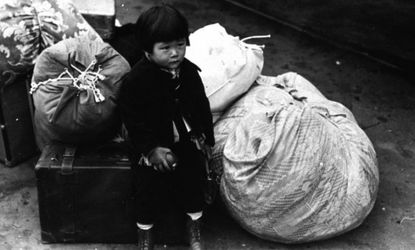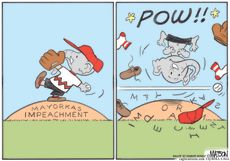Today in history: The shameful forced removal of Japanese-Americans
President Franklin Roosevelt signed an executive order to permit the forcible removal of Japanese-Americans from parts of the West Coast


February 19, 1942: Fearing sabotage during World War II, President Franklin Roosevelt signed Executive Order 9066, which ordered the forcible removal of Japanese-Americans from parts of the West Coast. FDR's order was followed by the relocation of approximately 110,000 Japanese-Americans and Japanese from the Pacific coast to internment camps. In the aftermath of Japan's attack on Pearl Harbor, there was fear that the West Coast would be attacked. Oregon was actually bombed in September 1942.
But FDR's order was not applied equally. While all who lived on the West Coast were interned, only about 1 percent of the 150,000-plus Japanese-Americans in Hawaii (which was attacked, of course) were. Those 150,000 comprised about one-third of Hawaii's population, and of the small number that was interned, most were American citizens.
In 1944, the Supreme Court upheld the constitutionality of the exclusion orders, but noted that the provisions that singled out people of Japanese ancestry were a separate issue outside the scope of the proceedings. How did the government identify Japanese-Americans? With the help of the Census Bureau, which provided confidential information.
Subscribe to The Week
Escape your echo chamber. Get the facts behind the news, plus analysis from multiple perspectives.

Sign up for The Week's Free Newsletters
From our morning news briefing to a weekly Good News Newsletter, get the best of The Week delivered directly to your inbox.
From our morning news briefing to a weekly Good News Newsletter, get the best of The Week delivered directly to your inbox.
In 1980, President Jimmy Carter oversaw an investigation meant to determine whether the internment order was justified. The Commission on Wartime Relocation and Internment of Civilians found little evidence of Japanese disloyalty and recommended the government pay reparations to the survivors. They formed a payment of $20,000 to each individual internment camp survivor. These were the reparations passed by President Ronald Reagan.
Quote of the day
"Philosophy is common sense with big words." -James Madison
More from West Wing Reports...
Sign up for Today's Best Articles in your inbox
A free daily email with the biggest news stories of the day – and the best features from TheWeek.com
Create an account with the same email registered to your subscription to unlock access.
-
 'A speaker courageous enough to stand up to the extremists in his own party'
'A speaker courageous enough to stand up to the extremists in his own party'Instant Opinion Opinion, comment and editorials of the day
By Harold Maass, The Week US Published
-
 How could the Supreme Court's Fischer v. US case impact the other Jan 6. trials including Trump's?
How could the Supreme Court's Fischer v. US case impact the other Jan 6. trials including Trump's?Today's Big Question A former Pennsylvania cop might hold the key to a major upheaval in how the courts treat the Capitol riot — and its alleged instigator
By Rafi Schwartz, The Week US Published
-
 Today's political cartoons - April 18, 2024
Today's political cartoons - April 18, 2024Cartoons Thursday's cartoons - impeachment Peanuts, record-breaking temperatures, and more
By The Week US Published